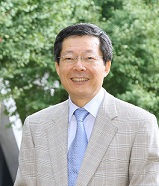
Prof. Hiroyuki Fujita
Professor
Institute of Industrial Science, The University of Tokyo
Director
Center for International Research on Micronano Mechatronics (CIRMM)
Email: [email protected]
Homepage: http://www.fujita3.iis.u-tokyo.ac.jp/
Dr.Hiroyuki Fujitareceived the B.S., M.S. and Ph.D. degrees from Department of Electrical Engineering of The University of Tokyo, Tokyo, Japan in 1975, 1977 and 1980, respectively.
Dr.Fujita currently engaged in the investigation of micro and nano electromechanical systems fabricated by IC-compatible processes and applications to bio and nano technology. Major research projects include MEMS-in-TEM experiment for simultaneous visualization and material property measurement of nano objects, and biomolecular characterization by using MEMS tools.He has published more than 300 papers in academic journals. He received M. Hetenyi Award of Experimental Mechanics from the Society for Experimental Mechanics in 1986, Chevalier de l'Ordre des Palmes Academiques from Government of France in 2001, The Prize for Science and Technology in Research Category from Japanese Ministry of Education, Culture, Sports, Science and Technology, Outstanding Achievement Award from The Institute of Electrical Engineers of Japan in 2005, and The Yamazaki-Teiichi Prize from Foundation for Promotion of Material Science and Technology of Japan in 2013.
The advance in micromachining technology has miniaturized the feature size of MEMS from micrometers to a few tens of nanometers and also widened the varieties of materials from metals and semiconductors to polymers and bio materials. This opens the way to handle and combine biological molecules and cells in MEMS. The simplest class of such bio-conjugated MEMS is micromachined tools for bio molecular/cellular detection and measurement. MEMS sensors for bio molecular detection, ultra-small chambers for single molecular/cellular measurement, and MEMS tweezers for bio molecular manipulation are all included in the class. The more advanced class is the heterogeneous integration of biological molecules and cells with MEMS. Microfluidic devices for three-dimensional cell culture and reconstructed bio-molecular-motor system on chip are in this class. In my talk, I will first introduce this concept and related research. Then I will give you some of our activities on bio-conjugated MEMS which are intended to contribute the progress in medicine. The first is silicon nano tweezers for capturing, handling and characterizing DNA. The damages in DNA molecules by radiation or chemicals can be in-situ monitored by the tweezers; this may help improving cancer radiotherapy and chemotherapy. The second is an on-chip-reconstructed bio-molecular-motor system, i.e. a microtubule-kinesin system, for the detection of microtubule-associate-proteins (MAPs). The measurement of MAP attachment capability to microtubules may lead to the early diagnosis of neurodegenerative disease such as Alzheimer̍s disease. Finally, I will show the self-organized formation of microvasculatures in engineered three-dimensional microstructures that allow transporting fluid in cultured tissue. Angiogenesis interaction between tumors and blood vessels can be modeled.
